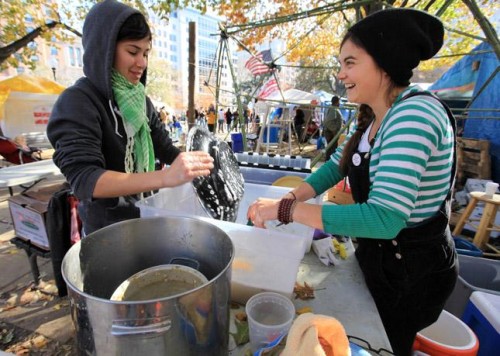
I grew up with a weird mix of influences. My parents were pastors of an Evangelical Friends Church in Wichita, Kansas. They were also radical social justice activists who were getting into all sorts of trouble with mainstream Christian culture. In the early 90s, they were taking me along to gay pride rallies. They trespassed at the local Air Force Base and stood on railroad tracks to block the transport of nuclear weapons. They involved me in creative protests at stores selling violent toys. My parents taught me that it was the duty of Christians to disobey unjust laws and reject violence – whether by individuals or the state.
My family straddled two worlds that are often kept apart: Biblically-based Christian discipleship, and radical movements for social transformation. It wasn’t until later that I would understand just how unusual, and amazing, this early training was. I got exposed to the nonviolent principles of Gandhi and King, as well as to a variety of other radical ideologies not explicitly based in the gospel. I absorbed all of this side by side with a reading of the Bible that emphasized God’s love for the poor and Jesus’ invitation to participate in a new social, political, and economic order.
Growing up in this milieu, I heard the word “solidarity” a lot. To be honest, I never quite figured out what it meant. It was a nice word to throw into an email to make myself sound a little more radical, but my understanding never went much beyond that. “Solidarity” was an insider word that helped signal that I was part of the movement.
The first time I truly began to grasp the meaning of the word “solidarity” was during the Occupy movement. Thousands of like-hearted people were coming together to make immediate, concrete change in our society. This was a new experience for me, on a whole new order of magnitude from the what I had seen before. It opened my eyes to what solidarity could mean in practice.
Suddenly, I was part of a community so much bigger than myself, a movement whose total focus was the transformation of the world, now. We made decisions together, we prepared food and tried to stay warm. When the police attacked, we all felt it. We were so identified with one another than an assault on another occupier felt like a personal slap in the face. “Solidarity” wasn’t just some convenient movement word anymore; it had taken on flesh and bone. We were ready to suffer and sacrifice for one another. We believed we could change the world through our endurance. And we did.
I find it striking how this experience of solidarity parallels with the story of the early church and other movements of the Holy Spirit. Solidarity corresponds to that sense of being “one body” that Paul describes in his first letter to the Corinthians. Communities gathered together by the Holy Spirit experience this kind of organic unity: a readiness to prioritize love for one another over personal fear and ambition.
For the thousands of us forever changed by our experiences in the Occupy movement, we know that solidarity is a key ingredient. It’s like salt, without which our lives have very little flavor. Yet solidarity is such a rare thing for many of us. It’s a reality that is lacking almost completely from middle-class American culture. We’re individuals. We don’t rely on one another. We’re not knit together as one fabric.
And why should we be? We don’t share one mission. Each of us looks out for our own interests – our careers and families, dreams for the future conceived of in personal rather than collective terms. At times it seems that there is nothing uniting us but shared consumption. But in the words of Charles Eisenstein: “Joint consumption doesn’t create intimacy. Only joint creativity and gifts create intimacy and connection.”
It’s time to break out of this middle class trap of fear and consumptive materialism. We’re invited to experience solidarity, which breaks down the barriers between us and creates genuine community. When we become friends of Jesus, we discover the true meaning of unity. Based in shared mission, gifts, and care for one another, we are drawn together as one body in his Spirit. Living as members of one another, we can discover a life that goes beyond the hungry selfishness of consumerism.
Are you ready to open yourself to this journey of discipleship together with me? The Holy Spirit is present to break your shackles and fill you with life. You have nothing to lose but your fear.